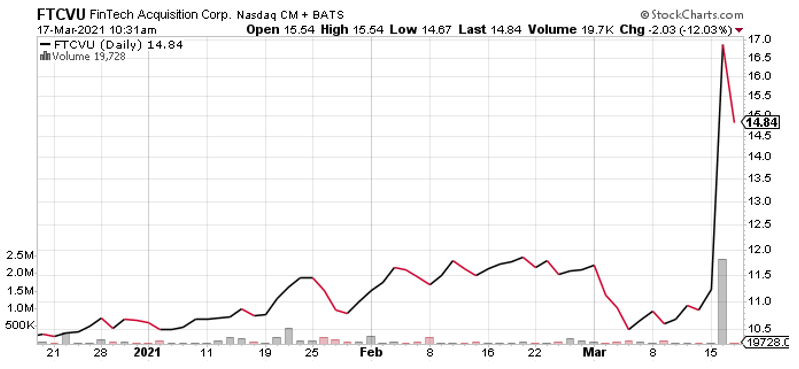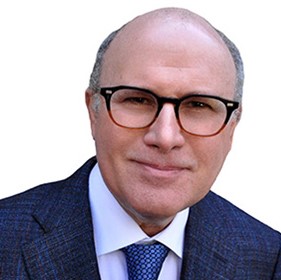Move over Robinhood, a new social-trading platform is coming to the United States … with the backing of some the world’s leading financial institutions. It’s going to be huge.
On Tuesday, the eToro platform made its public market debut via a special purpose acquisition company (SPAC). The Israeli firm boasts almost 20 million registered users and $605 million in 2020 sales.
Investors should consider buying the corresponding SPAC, FinTech Acquisition Corp. V (Nasdaq: FTCV).
eToro was born in 2007 when Yoni Assia, Ronen Assia and David Ring released code for an OpenBook investing platform. The breakthrough idea was members could view and automatically copy portfolios of other members. Several investment funding rounds later, in 2013, eToro announced no-commission trading and won the endorsement of regulators in the United Kingdom.
Related Post: Why Big Tech Stands to Benefit from New Scrutiny
The platform moved to Germany in 2014. Three years later, a module for cryptocurrency trading launched.
What separates eToro from so many other fintech startups is the management team has been careful to get the blessing of regulators at every step. Many disruptive companies routinely push the envelope, choosing speed over prudence. “Go fast and break things” was a Facebook, Inc. (Nasdaq: FB) motto.
The conservatism attracted big money American investors, including Betsy Cohen, an electronic banking pioneer. Cohen founded U.S. Bancorp (NYSE: USB) in 2000, one of the first FDIC-insured virtual banks. In 2015, she launched Financial Acquisition Corp., a financier helping promising financial-tech companies raise capital. The eToro incarnation is version five and values the company at $10 billion.
Cohen secured $650 million in capital from SoftBank Vision Fund 2, ION Investment Group, Third Point LLC, Fidelity Management & Research Company LLC and Wellington Management, among others.
Having backers with deep pockets is a good thing … yet the real sizzle in eToro’s story is its copycat feature. Once members fund a brokerage account and set up to follow popular members, the duplicate transactions occur automatically, in real time. Members can even gear the portfolios to their account size with fractional shares.
It’s a killer feature that comes from superior technology and scale.
And unlike Robinhood, eToro does not make money by selling order flow data. This means professional high-frequency traders are not front running the orders of smaller eToro investors.
The company makes money by acting a lot like a traditional bank. It charges stated fees on currency conversion, withdrawals and for inactivity. eToro also earns invisible fees based on the spreads between the bid and ask for traded securities. The combination of these businesses is surprisingly lucrative.
eToro generated $605 million in fees in 2020 on the strength of rampant growth in transaction volume. According to a press release on Tuesday, the company executed 75 million trades in January 2021 alone. And there is plenty of upside ahead.
Currently, most eToro accountholders live in Europe. The latest investor presentation put the number at 69%, with 18% in Asia and only 8% in the Americas.
At its root, eToro is a digital transformation story.
Investors are moving away from traditional brokers toward digital platforms where they can do research, converse with other investors and place trades. This workflow is especially entrenched with millennials, the bulk of eToro’s 18.7-million-member customer base.
Related Post: Pick Tech Stocks Carefully
Currently, there are 72 million millennials in the United States, the largest demographic. Accenture plc (NYSE: ACN) analysts estimate millennials will inherit $30 trillion from their parents.
Managers are projecting $2.5 billion in sales by 2025, an average compound growth rate in excess of 35%. Gross profits are expected to reach $700 billion. eToro recently logged gross profits of $95 million.
The expected growth rate for eToro is comparable to Square, Inc. (NYSE: SQ), PayPal Holdings, Inc. (Nasdaq: PYPL) and Shopify Inc. (NYSE: SHOP), yet shares were priced at 9.7 times expected net revenue for fiscal 2022, vs. 26.2 times for its comparable firms.
FinTech Acquisition Corp. V shares jumped 50% Tuesday, to $15.70. The stock still appears to be underpriced by 60%.
Savvy investors should consider using this weakness as a buying opportunity.
Best wishes,
Jon D. Markman




